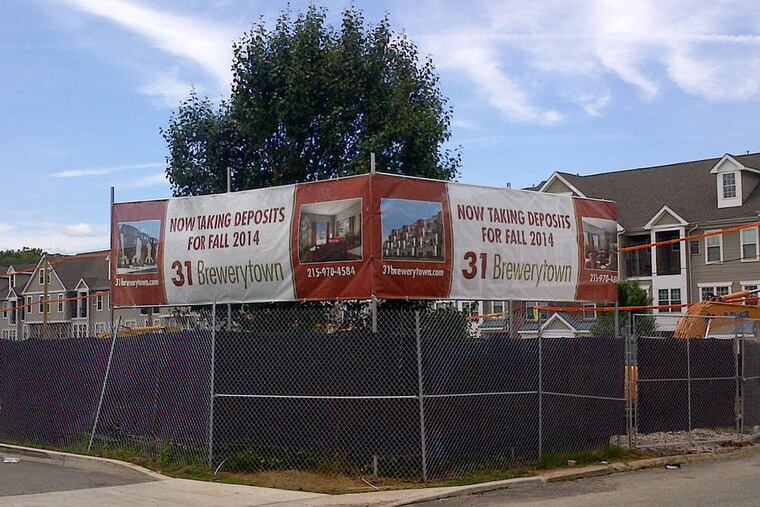Philly’s rapidly changing neighborhoods may be skewing the count of underwater mortgages
A report found the Philly area has one of the highest number of zip codes with mortgaged properties seriously underwater. The designation surprised local market watchers.

Philadelphia’s housing landscape is changing so fast it’s hard for realty tracking reports to keep up, and the city’s property tax abatements and method for assessing properties also complicate analyses.
Attom Data Solutions, a national real estate tracking firm, released a study last week aiming to identify the places where homeowners had the most equity in their homes and places where they owed more than the home’s value. It found that the Philadelphia metropolitan area is one of the regions with the highest number of zip codes where mortgaged properties were seriously underwater.
The designation surprised local market watchers.
“Generally speaking, people would not consider Philadelphia a place with a huge number of underwater properties," said Ira Goldstein, president of policy solutions at the Reinvestment Fund, a Philadelphia nonprofit that makes community development loans.
In the region that includes Philadelphia, Chester, Camden, and Wilmington, roughly 1 in 13 mortgaged homes were seriously underwater, which Attom defines as meaning that homeowners owe 25% more than the home’s estimated market value, according to the Attom report on the fourth quarter of 2019.
More than one in five mortgaged homes were equity-rich, meaning owners owed half or less of their home’s estimated market value.
The percentages of equity-rich properties in the nation and the Northeast region were higher. Of the 54.5 million homes with mortgages throughout the country, more than one in four were equity-rich, while roughly one in 16 were considered seriously underwater. Figures for the Northeast region as a whole were nearly identical.
The types of models Attom and its counterparts use rely on assessed values from counties and comparable sales in an area. For Philadelphia, these inputs can mean overestimating the number of underwater properties, Goldstein said.
That’s because many of the city’s neighborhoods are rapidly changing. Estimating values based on sales in an area may not take into account renovated properties that become worth more and cost more than their neighbors.
"The variability in sales prices in an area leads to overestimation of the underwater phenomena,” Goldstein said.
The city also has had trouble accurately assessing properties. An audit of the city’s property assessment methods released last year found that inaccuracies and deficient data resulted in incorrect assessments.
» READ MORE: Philly property assessments are flawed, audit finds
Recording a shift requires enough sales for comparisons. Attom acknowledged that it might take a few quarters for reports to reflect the narrow, swiftly changing picture in specific metropolitan areas such as Philadelphia’s.
The city’s tax abatements also cause the appearance of an underwater phenomenon, Goldstein said, because sellers can charge more for a property, and the inflation of house prices can throw off calculations.
Then there’s the role investors play, he said. They may be willing to take out a larger mortgage on a property than they would have otherwise because of the property’s rental potential.
In the Philadelphia metropolitan area, Attom found seven zip codes in which more than 25% of properties were seriously underwater: 19121 and 19132 in North Philadelphia, including parts of Strawberry Mansion and Brewerytown; 19013 in Chester; 08104 and 08105 in Camden; 08069 in Penns Grove, Salem County; and 19802 in Wilmington.
Following national and regional trends, more economically challenged regions of the Philadelphia metro area have higher numbers of properties that Attom considers seriously underwater.
The picture is mixed in North Philly’s 19121 zip code, where roughly 28% of properties classify as seriously underwater but almost as many — 25% — classify as equity rich.
A long period of increasing property values and the narrative of Philadelphia’s residential development boom are “not at all the full story,” said Michael Froehlich, managing attorney at Community Legal Services of Philadelphia. "There are many, many neighborhoods that are being forgotten in this development. ... Many homes are not appreciating. In fact, they’re depreciating.”
Current conversations about affordability are centering on property taxes and rising property values, not underwater properties, said Beth McConnell, policy director of the Philadelphia Association of Community Development Corporations.
But for residents who do find themselves underwater on their mortgages, “if they don’t want to sell their home right now, maybe it’s less of an issue," McConnell said.
Todd Teta, chief product officer at Attom Data Solutions, acknowledged that locally, regionally and nationally, equity has gone up and the number of underwater mortgages has declined since the housing market crash of a decade ago.
“But the significantly higher percentage of seriously underwater homeowners in the neighborhoods with lower median incomes might increase their chances of facing greater danger from foreclosures, which could make them more susceptible to increasing vacancies, which are then subject to poor maintenance or vandalism,” Teta said in a statement. “That can bring down property values, repel prospective buyers, and damage the character of a neighborhood.”